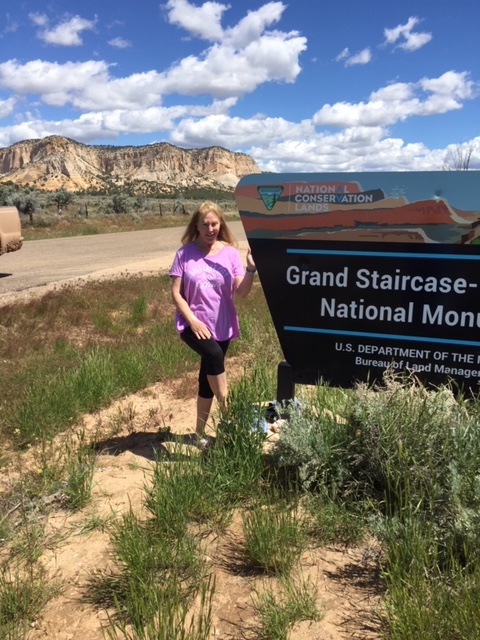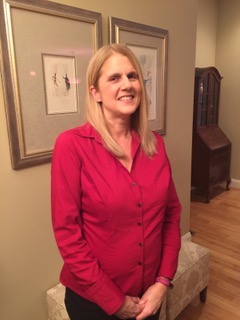Welcome to the Aphasia Threads Project, which usually weaves together three points-of-view: people with aphasia, caregivers, and the professionals who help each family navigate aphasia. Each week, we bring together three unrelated stories, one from each member of this triad, to learn from their experience. Yet this week, all three stories come from people with aphasia.
This week, we’ll hear from Terri, Barbara, and Jo Ann, three people with aphasia.

Person with Aphasia
I was having a normal day. I had just gotten back from a trip from Yellowstone National Park a few days before and was finishing unpacking and putting things away. When I went to sleep that night, I had no idea what was to come. I fell out of bed without knowing what had happened. Luckily, my husband was there to help me.

Aphasia Changes Your Life
The only way it has impacted my life is that I can no longer carry on a normal conversation, and this is devastating to me. My hope for the future is that someday I will be able to speak normally again. Luckily, with support from my husband, friends, and family members, my relationships are very good.
But There Are Things That Help
In the beginning, my tool of choice was Proloquo2Go. I don’t use it as much now, but considering the fact that in the beginning, I could only say I I I, it has helped me tremendously. Now I try to talk as much as I can, and if I can’t say a word, it helps that I can spell it.
And Things You Learn Along the Way
How much sleep I needed! I was tired all the time, and I wondered what was wrong with me. Turns out I needed to sleep a lot for my brain to heal. No one told me that. This was in the beginning—now I’m fine—but I found this out on the Internet!
What Caregivers and Professionals Can Learn From Me
It takes a tremendous amount of patience for anyone dealing with aphasia. There are so many issues concerning depression, loss of speech, not getting enough sleep. The list goes on and on, and I wish I had known more in the beginning. My advice is to be patient, understanding, and kind. My therapists have been all been phenomenal!
It would be easy to give up sometimes, but you can’t! Live each day to the fullest, and if you can’t speak every day, so what! I saw a woman while at a restaurant the other day and she had no arms, and yet she was doing things! It’s okay to feel sorry for yourself once in a while, but after that, go ahead and get on with your life.

Person with Aphasia
I was diagnosed with a brain tumor in August 2015. I underwent three surgeries and it left me with aphasia and apraxia.

Aphasia Changes Your Life
To say the least, it impacts me in so many ways.
But There Are Things That Help
Word app.
And Things You Learn Along the Way
There are so many tools that you have available to you. The best advice I can give to you is to keep on speaking—slow and steady wins the race. I find in the morning my speech and my thought process are more fluent. As the day goes on, my speech is garbled and I have difficulty with putting my thoughts together.

What Caregivers and Professionals Can Learn From Me
You must take the time to listen to people who have aphasia. Don’t fill in the words for them.
Be patient and have compassion with people that have aphasia.

Person with Aphasia
Hemorrhagic stroke in the left side thalamus—I’m a 22-year survivor. I have right-side paralysis, aphasic, double vision. Heck of a position for someone who used to make their living in radio (long retired but the tone, the thought pattern, the patter was foreign, this was not me).

Aphasia Changes Your Life
I’m shyer now. I speak slower, more deliberately, but I do keep talking. If I’m tired or stressed, it’s hard for me to call up words. If you watch my hand, you’ll see me touch my thumb to each fingertips trying to call on each of my senses to release the word.
But There Are Things That Help
Keep talking. I used to watch young babies as they babbled to master our language and realized everything they do is a learning exercise. We need to do the same.
And Things You Learn Along the Way
My breakthrough was using flashcards. Don’t get discouraged. If all you vocalize today is a pffft, tomorrow, it may be the whole word. Also, don’t be afraid to sing your words . . . even if you are loud and off-key! For me, that opened a new avenue to my vocabulary stockpile and slid me past the broken pause button that held my voice in silence.
What Caregivers and Professionals Can Learn From Me
There are times it can create humorous situations. For example, my husband and I went to an event with hundreds of party-goers. There was no place to sit except one table with three people who were quite drunk. The woman would not let anyone sit because, in her mind, it was her table. My legs couldn’t carry me any further so I sat. Because of the aphasia, I spoke with a 6-beer-slur (even though I’m a teetotaler). She thought she had found her best friend. Someone she could talk to that sounded just like her. We were happy to have found a place to sit. It was a win-win for all.
I’m a published author. My second book was released on Sept 24th and is called Trapped Within. This is the accompanying blurb: That day started like any other, but by lunchtime, I was fighting for my very life. A stroke is like that. You don’t see it coming. There was nothing to do but let nature take its course-no guarantee I’d live much less return to full health. This is a true story about survival, recovery, love, and hope. For more information, please visit my website at www.JoAnnGlim.com.

Want to Be Featured in a Future Article?
Aphasia Threads is an on-going project created by the National Aphasia Association. If you’d like to be featured, don’t leave a comment.
Instead, please read the opening post for more information or fill out our form and we’ll contact you.



